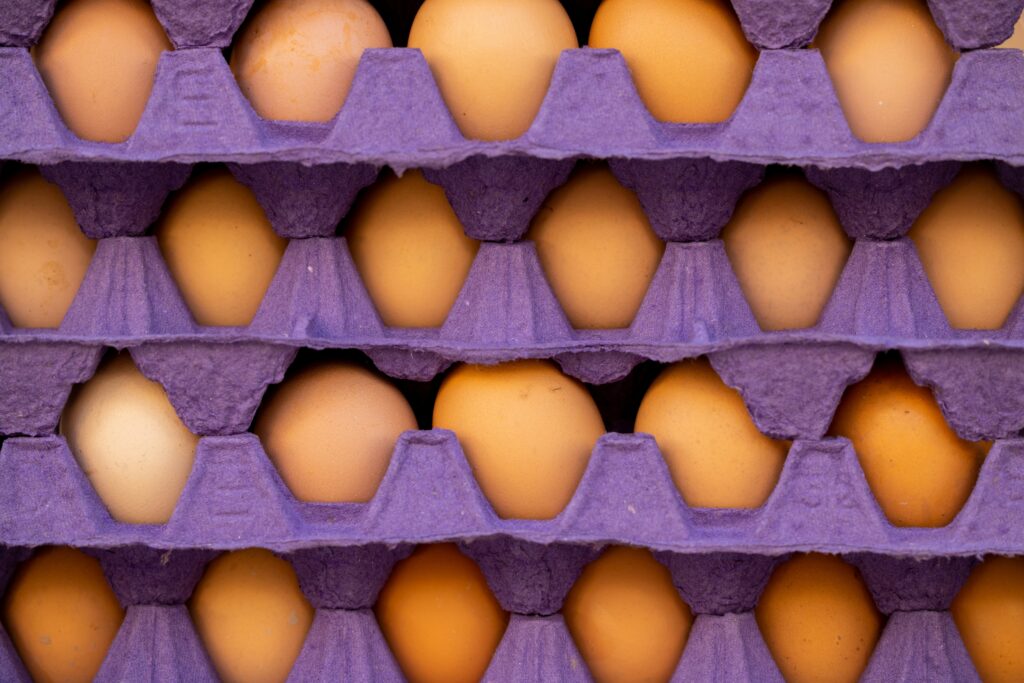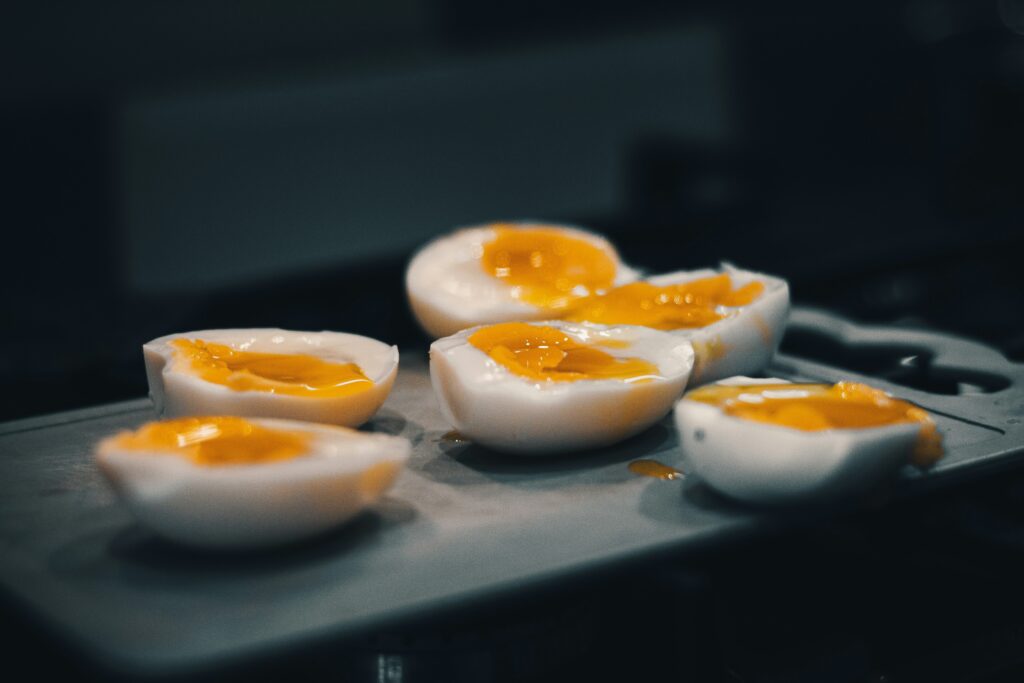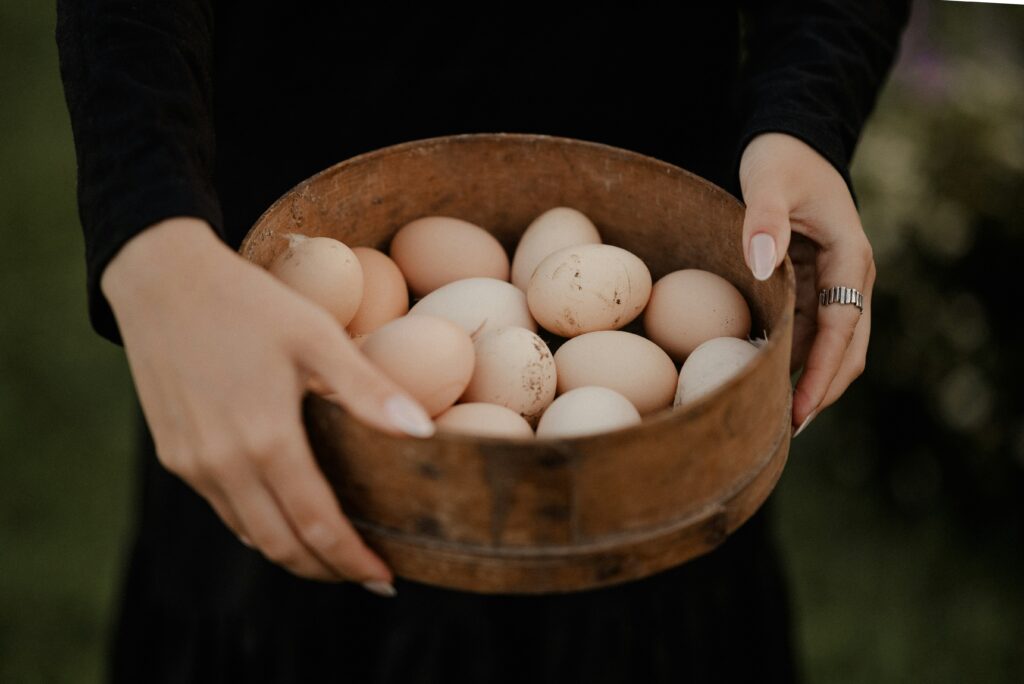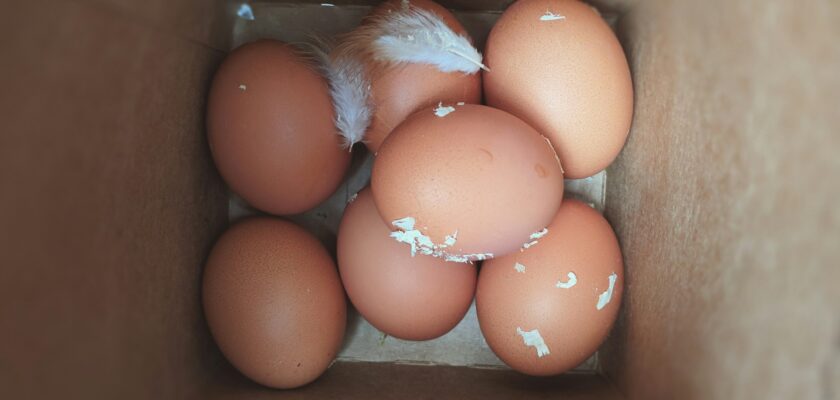Introduction: Why Egg Storage Matters
Fresh eggs straight from the farm are packed with flavor, nutrients, and a little-known natural defense—what’s called the “bloom.” But storing them wrong? That could cut their shelf life in half or even pose safety risks. Whether you’re a backyard chicken keeper, a homesteader, or just someone who shops local, understanding how to handle unwashed farm eggs is essential. This guide dives deep into the shelf life of unwashed eggs, how to store them properly, and the science behind keeping them fresher for longer.

Photo by engin akyurt on Unsplash
Understanding the Bloom: Nature’s Protective Barrier
Unwashed farm fresh eggs come with a natural coating called the bloom or cuticle. It’s a protective layer deposited by the hen as the egg is laid, sealing the pores in the shell to block out bacteria and moisture loss.
Key Functions of the Bloom:
- Preserves freshness by reducing moisture loss.
- Protects against bacteria like Salmonella entering through the shell.
- Extends shelf life when eggs are stored at room temperature.
This layer is why unwashed eggs can safely sit on a countertop for weeks—something store-bought eggs can’t boast due to commercial washing.
Unwashed vs. Washed Eggs: What’s the Difference?
The major distinction between unwashed and washed eggs is their shelf life and safety without refrigeration.
| Feature | Unwashed Eggs | Washed Eggs |
| Protective Bloom | Intact | Removed |
| Shelf Life (Room Temp) | 2–4 weeks | 2–3 days |
| Shelf Life (Refrigerated) | 3+ months | 4–5 weeks |
| Need for Immediate Refrigeration | No | Yes |
Pro Tip: Once you wash an egg, it must be refrigerated immediately to avoid spoilage.
How Long Do Unwashed Farm Eggs Last at Room Temperature?
Unwashed farm eggs can last between 2 to 4 weeks on the countertop, assuming they’re kept in a cool, dry place. The exact shelf life depends on the environment:
- 70°F (21°C): 2 weeks safe storage
- 60°F (15°C): Up to 3–4 weeks
- Over 75°F (24°C): Storage becomes risky after 1 week
It’s critical to avoid high humidity or direct sunlight. If you’re not sure how long your eggs have been out, use the water float test (covered below).
Refrigeration vs. Countertop: Which Method Wins?
While unwashed eggs can stay on the counter, refrigerating them extends freshness up to 3 months or more. Here’s a breakdown:
Advantages of Refrigeration:
- Longer shelf life
- Slows bacterial growth
- Preserves internal egg quality
However, moving eggs from counter to fridge after several days of being unrefrigerated may lead to condensation, which can encourage bacteria.
Best Practice: Choose one method—either refrigerate from the start or keep consistently at room temperature.
Temperature and Humidity: How They Affect Shelf Life
Eggs are sensitive to temperature swings and humidity changes. Moisture can seep into the shell or cause mold, while heat accelerates spoilage.
| Storage Factor | Ideal Range |
| Temperature | 45–60°F (7–15°C) |
| Humidity | Below 75% |
| Light | Dark or shaded areas preferred |
Investing in a basic thermometer or hygrometer can help maintain ideal storage conditions.

Photo by Alexander Belov on Unsplash
Signs of Spoiled Eggs: What to Watch Out For
Even unwashed eggs can go bad. Watch for:
- Off-smell: A sulfur or rotten odor when cracked
- Cloudy whites or pinkish yolks: Signs of bacterial growth
- Mold or residue on shell
- Floaters: Eggs that float in water have likely gone bad
If in doubt, toss it out—better safe than sorry.
How to Perform the Water Float Test
This classic homestead test is simple, reliable, and surprisingly accurate.
How to do it:
- Fill a bowl with cold water.
- Gently place the egg in the water.
| Egg Position | Freshness |
| Sinks & lays flat | Very fresh |
| Sinks but stands upright | 1–2 weeks old |
| Floats to top | Spoiled |
Safe Handling Tips for Farm Fresh Eggs
To reduce contamination and prolong shelf life:
- Don’t wash eggs until ready to use
- Store in a clean, dry carton
- Label collection dates
- Avoid storing near strong odors (like onions or garlic)
Eggshells are porous, so strong smells and bacteria can seep through over time.
Best Containers for Storing Unwashed Eggs
Choosing the right storage container helps maintain both freshness and safety. Farm fresh eggs need good airflow, separation, and protection from temperature fluctuations.
Ideal Storage Options:
- Cardboard egg cartons: Best for breathability and maintaining temperature stability.
- Ceramic egg trays: Stylish and effective for countertop use.
- Wire baskets with padding: Great for short-term countertop storage with airflow.
- Do not use: Plastic clamshells (trap moisture) or airtight containers (encourage condensation).
Pro Tip: Always store eggs with the pointy end down to keep the yolk centered and extend shelf life.
Should You Refrigerate Unwashed Eggs After a Few Days?
This is where things get a bit tricky. If your eggs have been stored at room temperature for more than a week, refrigeration can cause condensation to form on the shell—creating an ideal breeding ground for bacteria if the bloom is still intact.
Best Practice:
- If you begin at room temperature, leave them there until use (up to 3–4 weeks).
- If you’re unsure about freshness, perform a float test and then refrigerate if still good.
- Once refrigerated, do not return eggs to room temp.
Consistency is the key. Frequent switching can reduce shelf life and increase contamination risk.
Can You Freeze Farm Fresh Eggs? (And How to Do It Right)
Absolutely. Freezing is an excellent option if you’ve got a surplus. But there’s a catch—you can’t freeze them whole in the shell.
How to Freeze Eggs:
- Crack eggs into a bowl (don’t freeze with the shell on).
- Beat gently with a fork to combine whites and yolks.
- Optional: Add a pinch of salt (for savory) or sugar (for baking).
- Pour into freezer-safe containers or silicone ice cube trays.
- Label with the date and number of eggs per portion.
Frozen eggs last up to 1 year and are great for baking or scrambling.
External Source Tip: The USDA’s egg freezing guide offers in-depth safety protocols: USDA – Freezing and Food Safety

Photo by Jana Ohajdova on Unsplash
Local Regulations & Egg Storage Standards
In the U.S., commercial eggs must be washed and refrigerated immediately. But farm fresh eggs sold directly from small farms or farmers markets are often unwashed and exempt from certain FDA regulations.
Regulations Vary:
- EU and UK: Prohibit washing; encourage room-temp storage.
- U.S.: Requires washing and refrigeration for commercial sales.
- Farmgate sales: Often allow unwashed, unrefrigerated eggs—check your state laws.
Being familiar with your local health department’s guidelines ensures both compliance and safety when selling or gifting your eggs.
Nutritional Impact: Does Storage Affect Quality?
Eggs are nutrient-dense, but prolonged exposure to heat and air can cause nutrient degradation, especially in:
- Vitamin A
- B Vitamins
- Antioxidants in the yolk
Cold storage preserves nutrition far longer than ambient temperatures. However, when stored correctly, unwashed eggs retain their taste, texture, and most nutrients quite well.
Expert Tips from Homesteaders and Farmers
Seasoned egg collectors swear by a few tried-and-true practices:
- Rotate your stock: First in, first out.
- Collect daily: Reduces contamination risk.
- Use natural lime or mineral oil to coat washed eggs for extended shelf life.
- Keep eggs away from fluctuating heat sources like stoves or sunny windows.
Egg management is part science, part habit—and the more consistent you are, the longer they’ll stay fresh.
Common Myths About Farm Egg Storage
Let’s bust a few myths that float around backyard chicken communities and homestead blogs:
- “Eggs go bad after one week.”
→ Not true if unwashed and properly stored. - “Refrigerated eggs can be left out again.”
→ Once chilled, they must stay chilled. - “The shell protects from everything.”
→ Only if the bloom is intact—washing removes this barrier. - “All floaters are bad.”
→ Not always; some older but still usable eggs float. Crack them open and check for smell or discoloration.
Understanding what’s fact vs. fiction can help you make smarter storage choices.
FAQs
1. Can I leave unwashed farm eggs on the counter year-round?
Yes, as long as your indoor temperature remains under 75°F (24°C). Hot and humid conditions shorten their shelf life drastically.
2. What’s the best temperature to store unwashed eggs?
Between 45°F and 60°F is ideal—cool, dry, and dark conditions mimic natural nest environments.
3. Should I rinse dirty eggs?
Only before use. If eggs are visibly soiled, gently dry-brush dirt off. Washing early removes the bloom.
4. Can I eat an egg that stands upright in water but doesn’t float?
Yes, these eggs are still usable but older. Best for baking or hard boiling.
5. Is there a difference in taste between refrigerated and non-refrigerated eggs?
Yes—some people say room-temp eggs have a creamier texture, especially when poached or fried.
6. Are fertilized eggs safe to eat?
Absolutely. Fertilization doesn’t affect edibility unless incubation starts (which won’t happen without a broody hen or incubator).

Photo by Valeria Reverdo on Unsplash
Conclusion: Best Practices for Maximum Freshness
Unwashed farm fresh eggs are one of nature’s most perfectly packaged foods. Their natural bloom gives them a longer shelf life on the counter and makes them safe—when handled properly.
